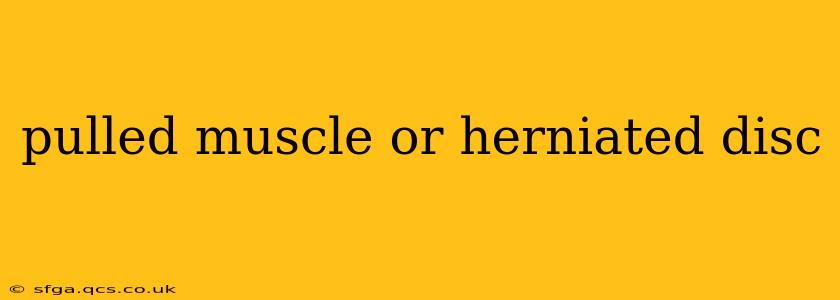Experiencing lower back pain? It's a common ailment, and often the first question is: is it a pulled muscle or a herniated disc? Distinguishing between these two conditions is crucial for effective treatment. This comprehensive guide will help you understand the differences, symptoms, diagnosis, and treatment options for pulled muscles and herniated discs.
What is a Pulled Muscle?
A pulled muscle, also known as a muscle strain, occurs when muscle fibers are overstretched or torn. This often happens during strenuous activities, sudden movements, or repetitive motions. The severity of a pulled muscle ranges from mild discomfort to significant pain and impairment. Lower back strains are particularly common due to the complex network of muscles supporting the spine.
Symptoms of a Pulled Muscle in the Lower Back:
- Localized pain: The pain is usually concentrated in the affected muscle area.
- Muscle spasms: Tightness and involuntary muscle contractions can occur.
- Swelling and tenderness: The area may feel swollen and tender to the touch.
- Limited range of motion: Bending, twisting, or lifting may be painful and restricted.
- Pain that worsens with activity: Physical exertion typically increases pain.
What is a Herniated Disc?
A herniated disc occurs when the soft, gel-like center of an intervertebral disc pushes through a tear in the tougher outer layer. This can put pressure on nearby nerves, leading to pain, numbness, and weakness. Herniated discs are most common in the lower back (lumbar spine) but can occur in other areas of the spine as well.
Symptoms of a Herniated Disc in the Lower Back:
- Pain radiating down the leg (sciatica): This is a hallmark symptom, often affecting one leg more than the other.
- Numbness or tingling: Sensations of numbness or tingling can extend down the leg and into the foot.
- Muscle weakness: Weakness in the leg or foot muscles may be experienced.
- Pain that worsens with coughing or sneezing: Increased pressure in the abdomen can exacerbate the pain.
- Pain that may improve with rest: Unlike a pulled muscle, pain might be less intense during periods of rest.
How are Pulled Muscles and Herniated Discs Diagnosed?
Diagnosing a pulled muscle or herniated disc typically involves a physical examination and a review of your medical history. Your doctor will assess your symptoms, range of motion, and neurological function.
Diagnostic Tests:
- Imaging tests (X-rays, MRI, CT scans): These tests help visualize the spine and surrounding structures to identify a herniated disc or rule out other causes of lower back pain. X-rays may not show a herniated disc, while MRI provides more detailed images of soft tissues.
- Nerve conduction studies (NCS) and electromyography (EMG): These tests help assess nerve function and can help distinguish between nerve compression from a herniated disc and other nerve-related issues.
How are Pulled Muscles and Herniated Discs Treated?
Treatment options for pulled muscles and herniated discs vary depending on the severity of the condition.
Treatment for Pulled Muscles:
- Rest: Avoiding activities that aggravate the pain.
- Ice: Applying ice packs to reduce swelling and inflammation.
- Over-the-counter pain relievers: Medications like ibuprofen or naproxen can help manage pain and inflammation.
- Physical therapy: Exercises to strengthen the back muscles and improve flexibility.
Treatment for Herniated Discs:
- Conservative management: This often involves rest, ice, pain relievers, and physical therapy.
- Epidural steroid injections: These injections can reduce inflammation and pain around the nerve roots.
- Surgery: In severe cases, surgery may be necessary to remove the herniated disc material or decompress the nerve.
Can a Pulled Muscle Turn into a Herniated Disc?
No, a pulled muscle cannot directly turn into a herniated disc. They are distinct conditions with different causes and mechanisms. However, chronic muscle strain or improper lifting techniques can indirectly contribute to disc problems over time by increasing stress on the spine.
How Long Does it Take to Recover from a Pulled Muscle or Herniated Disc?
Recovery time varies greatly depending on the severity of the condition and individual factors. Pulled muscles usually heal within a few weeks with proper care. Herniated discs can take longer to heal, sometimes requiring months or even longer, depending on the treatment approach.
What are the Best Exercises for Lower Back Pain?
Gentle exercises that strengthen core muscles and improve flexibility are generally recommended for both pulled muscles and herniated discs. However, it's crucial to consult a physical therapist for a personalized exercise program tailored to your specific condition. Avoid strenuous activities until the pain subsides.
This information is for general knowledge and does not constitute medical advice. Always consult a healthcare professional for diagnosis and treatment of any medical condition.
